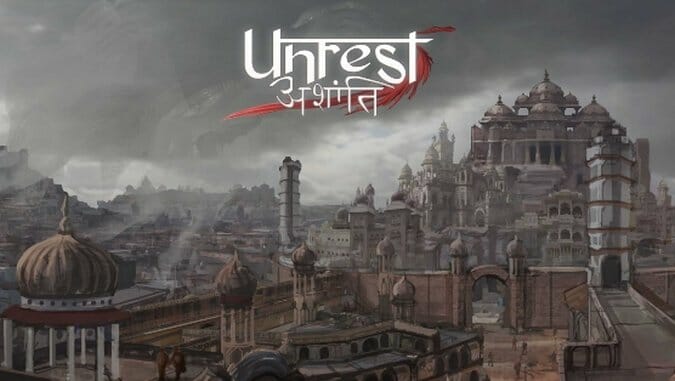Unrest (PC)

As an escapist form of entertainment, games have long played the role of power fantasies. Perhaps no single genre has more purely reveled in the power the medium offers to its participants than the role-playing game. Subverting such an element rooted to the core of the medium and purposely making the player feel helpless was deemed far too risky for the designers to bother with it. However, of late there has been a slow trickle of games like Papo & Yo and Mainichi that aim to create empathy by putting players in the shoes of characters who would most likely be ignored in more traditional game narratives. Pyrodactyl Games’ Unrest, set in a fantastical version of ancient India, focuses on characters whose destinies are chained by the rigid and claustrophobic class/caste system.
To accommodate such a unique approach, Unrest makes key alterations to what we have come to traditionally expect from our role-playing games. It firstly removes the combat aspect almost completely from the game. Barring a few scenarios, the game is entirely based on exploration and interaction through dialogue. Secondly, its narrative scope is restrained by choosing to focus only on the civil unrest of the city Bhimra rather than going for an epic, world-altering quest. By keeping itself grounded, Unrest is able to avoid completely falling off its wheels before it even gets a chance to get on the road.
Brought to life by beautiful hand-drawn backgrounds and classical Indian music, Unrest narrates the story of the city Bhimra during civil strife, which is spread across eight chapters and conveyed through the different perspectives of five central characters that are born into different economic classes and social castes. As was the case in ancient India, the former is potentially malleable while the later sticks as an indelible mark you have to carry for the rest of your life. The characters you play as are acutely aware of the divisions in this rigged society and their interactions are generally shaded by the prejudice inherent in the culture. By putting you in the shoes of a princess, an ambassador from a rival kingdom, a peasant girl, a priest and a mercenary captain, Unrest doesn’t just offer different perspectives of the central strife, but also allows players to experience life in a culture of inequality where birth decides the life’s destiny. Such caste-based divisions result in some interesting moral dilemmas that go beyond the simple black and white paradigm, focusing more on the vague outcomes and the risks of overstepping one’s social boundaries.
Most of the interactions happen through conversations which are characterized by a dialogue system. On first glance it feels familiar to recent BioWare RPGs, with a specific tone associated with each dialogue option. Unrest tries to distinguish that element with a “Friendship Fear Respect” (FRF) system which expresses each NPC’s affinity towards the player through the eponymous aspects. Initially, it seems like a smart idea to describe a society with clear demarcations on caste-centric superiority based on fear and respect, but Unrest never utilizes the FRF system beyond the very basics. Instead, it’s merely used as an indicator of what each NPC thinks of the player, and even that doesn’t affect your interactions in any meaningful way. The writing also suffers a bit from being anglicized and comes across as jarringly modern for the sake of accessibility. Despite that, it still manages to do a serviceable job of portraying the game’s moral maturity and pessimism drawn from those who are trapped by societal boundaries towards the variety of situations the narrative presents.
Sadly, those aren’t the only problems facing Unrest. The limited scope of the game sometimes tends to work against its attempts in investing the player in its affairs. Four out of the five characters feature in a lone chapter of their own, thus limiting the “decision-effect” element largely to that chapter alone. Some of the chapters themselves are very short, severely restricting the time the narrative has to flesh out the characters and their motives. The manner in which chapters and perspectives shift is jarring in itself: occurring without warning and abruptly concluding the current chapter with a short epilogue, directly abandoning any sidequests you may have undertaken. Such abrupt interruptions underwhelm a player’s commitment, making them feel more chained by the whims of the narrative than they actually are. Where the game could have presented such a narrative restriction as a part of the power dynamic associated with its caste structure, its inability to do so makes significant parts of the narrative fall flat.
The aforementioned combat, while limited to merely three situations, is laughably clumsy, boiling down to simple attack and block that are supposed to be timed with the oddly animated sprites on-screen. It’s a good thing the game doesn’t force this element onto the player more often as it is easily Unrest’s most unnecessary and least impressive element.
